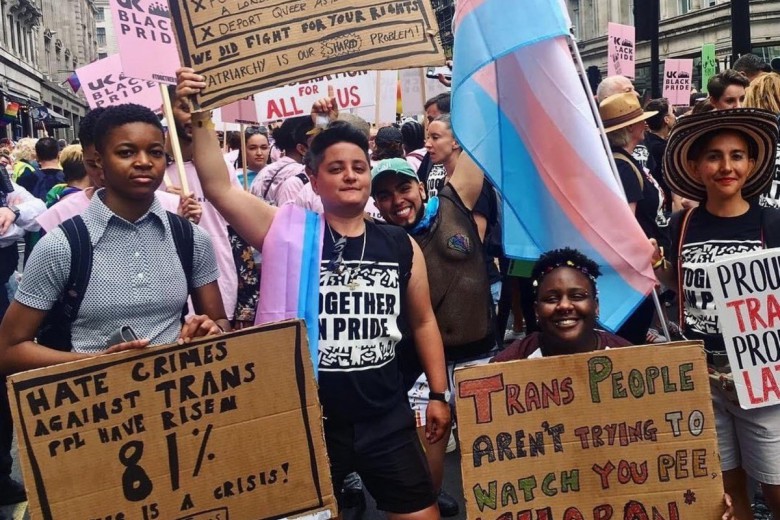
I got into sex work to avoid the trappings of capitalism and how it affects people like a barista making $10 an hour,” says Jeff Kingsley,* a seasoned sex worker living in Toronto.
Sex work is understood in mainstream media and politics to be a conversation about sex, sexuality, bodies, and a woman’s freedom and safety. Another position argues that sex work encompasses a conversation between sex and economics, currency and bodies. In any case, sex work is not limited to a woman’s trade – nor is it limited to experiences of force and coercion.
Kingsley suggests that he has been partially able to achieve his goal of retrieving some power through sex work, but in ways he had not expected.
“I am able to move through [economic] classes more quickly and easily than others. That said, I have to participate in capitalist and middle-class presentations of image and self to be able to engage in the type of sex work with [the] type of clients that allow me to move forward in my goals in higher education and in life,” says Kingsley. “It has given me the ability to achieve a middle-class identity more so than most people would think and perhaps even against my political leaning. That said, I am a white male and able-bodied, so I am quite a privileged sex worker.”
Under the current economic system, sex work in Canada is a profoundly contentious issue, with some calling for full decriminalization of sex work and many others condemning the act of selling sex altogether. Neither position provides any real answers to the lived reality of sex workers in Canada.
Queer class struggle
Kingsley suggests that non-profits that advocate for the rights of sex workers would ideally operate as unions that fight for the labour rights of those in the field. Sex workers already have a history of involvement in labour unions, proving that sex workers’ rights are the same fundamental rights all workers seek: safe working conditions and protection under the law. Trish Salah, a contributor to the recent book Selling Sex: Experience, Advocacy, and Research on Sex Work in Canada, says sex work entered the union movement in Canada in the 1990s when she and others worked with the Canadian Union of Public Employees (CUPE) Local 3903 to bring labour rights to transgender unionists.
The struggle took off at CUPE’s 2001 national convention where trans unionists fought for resolution 189, which sought to address the labour violations and violence that trans sex workers faced. The resolution (which passed) called for CUPE to stand with trans unionists and sex workers for the decriminalization of sex work in Canada. In the long battle for legal reform, this resolution carried with it tremendous weight for the actualization of both sex worker and trans rights.
Salah argues that unions have a duty to recognize the flexibility sex workers need in adapting to a variety of work sites and models of operation. She notes that much of the practical debate over whether sex workers can be unionized or not stems from their ever-shifting and changing workplaces that in turn create ever-shifting and changing needs. From escort services to internet-based work to the street-based trade, there is no uniform solution for the needs of sex workers. Instead, a framework of rights must be created that addresses the needs of a diverse community.
Emma Caterine is a New York-based member of a sex worker advocacy group called the Red Umbrella Project and a community organizer with Black and Pink, an LGBTQ prison abolition group. In June, Caterine took to Twitter to address the class dimensions of the sex workers’ rights movement. “Nothing says class war in [the] sex workers rights movement like the silence about the recent kink.com protests and arrests,” she wrote. Caterine was referring to protest actions by the queer group Gay Shame that targeted the popular pornography website kink.com for hosting a themed party that seemed to celebrate the prison industrial complex and its brutalization of trans and gender-queer people. The protesters were allegedly beaten by private security before being arrested. In this conflict, we see the gap between queer identity and the privileges that some groups have within the sex trade.
An island, outside of public view
Last year, Toronto city councillor Giorgio Mammoliti suggested moving sex clubs and brothels to the Toronto Islands, creating a type of red-light district.
“What this suggests is that these things are obviously going on but they shouldn’t be going on in our communities, “ says Kingsley. “Mammoliti made this suggestion so as to physically separate an already marginalized community, so to speak, to a physically removed and alienated place outside of public view.”
While Mammoliti’s plan wasn’t taken seriously, Kingsley says it shows how politicians speak within a paradigm that “imagines sex workers to be people who operate outside of our society.”
It is within that paradigm that Justice Minister Peter MacKay and the Conservative government have put forward Bill C-36 which aims to criminalize johns and the act of purchasing and negotiating sex work. “Politicians frame sex workers as ‘others’ … without considering the fact that these people are members of our communities,” says Kingsley.
Bill C-36Full title: The Protection of Communities and Exploited Persons Act
Sponsor: Conservative Justice Minister Peter MacKayBill C-36 would criminalize the purchase of sex and prohibit communication for the purpose of prostitution and the advertising of sexual services to others.
The bill responds to a Supreme Court of Canada ruling in December that struck down Canada’s existing prostitution laws as unconstitutional, saying they violated the Charter of Rights and Freedoms. The court found that existing laws threatened sex workers’ rights to life, liberty, and security of person. Critics of Bill C-36 say it does the same thing and, further, that it would make organizing among sex workers themselves more difficult.
Under the legislation, the punishment for purchasing sexual services would range from cash fines to jail time.
The group of sex workers’ advocates whose challenge led to the December supreme court decision has promised to fight the new legislation. Many sex workers oppose the bill as do both the Liberal and NDP opposition parties.
Peter MacKay proposed Bill C-36 based on the argument that not only are sex workers in Canada mainly victims of sex trafficking but that the exchange of sex for cash, goods, or services is an inherently victimizing act that must not occur in public spaces. Such a proposition forces sex work back into the dark corners and alleys, leaving little light or space for sex workers to negotiate their own conditions of safety.
This summer, Toronto hosted the 2014 World Pride celebration. As a former sex worker and a queer woman, it was strange to witness the public celebration of gay and queer identity – in highly commodified forms – while the fate of my brothers and sisters in the sex trade hung in the balance as committee hearings on Bill C-36 continued on Parliament Hill. There were bright lights on the commodification and economics of sexuality, with official Pride sponsorship by TD Bank and the pharmaceutical giant Pfizer, while the livelihoods and rights of sex workers were subjected to the dark whims of Tory politicians.
Kingsley suggests that the difference between MacKay’s Bill C-36 and Mammoliti’s suggestion of a red-light district on the Toronto Islands is that one denies the existence and needs of sex workers and the other simply tries to relocate them outside of the city and outside of class dimensions – and it seems like the conversation on sex work in Canada ends there. While sex workers’ rights activists fight for lawful recognition and their right to organize as workers, politicians seek to usurp the right to determine the conditions of our own sexual practices.
*Name has been changed to protect his identity.






